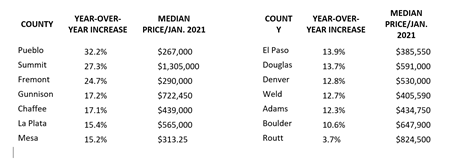
Coalition Tackles Housing Affordability Crisis with Introduction of Four Bills Aimed At Improving Short- And Long-Term Opportunities For Homeownership For All Coloradans
DENVER – With a growing list of housing affordability issues surfacing across the state, the Colorado Association of REALTORS® (CAR) has joined forces with Habitat for Humanity of Colorado to introduce a package of legislation designed to help improve the state’s long-term homeownership scenario and economic growth by addressing issues of housing affordability and access.
Working with the support of a broad range of housing industry and related service organizations, the bill package focuses on improving Colorado’s homeownership opportunities through financial education, credit building recommendations, improved state reporting and incentivizing best practices and program implementation for affordable housing at the local level.
Highlights of the recently introduced bills include:
HB21-1271 — Affordable Housing Incentive Program – A part of The Colorado Recovery Plan 2021 Stimulus introduced on March 10, 2021 (page 8 of the report), this program supports and incentivizes local governments to remove barriers and adopt best practices for affordable housing development. It creates 3 different programs in the Department of Local Affairs (DOLA) to promote innovative solutions to the development of affordable housing across the state. Together, the programs provide for $13 million in state stimulus funds to jump start development in the next three years.
- The Affordable Housing Guided Toolkit and Local Officials Guide helps local governments develop an overall affordable housing strategy.
- The Planning Grant Program awards local governments funding for assistance to adopt qualifying land use strategies including a needs assessment, reviewing model land use codes, or making investments in its community that would enable the local government to be competitive in applying for a housing development incentives grant.
- The Housing Development Incentives Grant supports local governments to adopt effective tools to spur housing creation. The menu of strategy options is broad enough that any community can be successful in finding the right mix of strategies that fit its community, or the local government may introduce its own innovative or unique approach. Sponsors: Rep. Julie McCluskie, Rep. Iman Jodeh, Rep. Julie Gonzales.
HB21-1134 – Establishes a statewide pilot program enabling residents residing in properties selected by Colorado Housing Finance Authority to volunteer to have their rent payments reported to consumer credit bureaus. Rent reporting establishes a basic foundation from which younger buyers, first-time buyers, minorities, lower-income households and many others can begin to establish or build credit. Sponsors: Rep. Naquetta Ricks; and Sen. Jeff Bridges.
HB21-1028 – Requiring annual reporting from the Division of Housing on the total amount of money the division or the state housing board received from any federal, state or other public or private source during the prior fiscal year, as well as the total amount expended from federal and state funding during the prior fiscal year for the provision of affordable housing. This bill will not only tell us how many units of housing we are creating and preserving, but what type of programs they address such as rapid rehousing and supportive housing, rental or homeownership, and in which locales of the state they are taking place. Sponsors: Rep. Shannon Bird; Rep. Janice Rich; Sen. Tammy Story; and Sen. Robert Woodward.
HB21-1200 — Financial Literacy Education high school curriculum would include studies and understanding of credit, debt, student loans, as well as preparation for homeownership and retirement.
The bill directs the state board of education to review standards relating to the knowledge and skills that a 9-12th grade student should acquire in school to ensure an understanding of the costs associated with obtaining a postsecondary degree or credential and how to budget for and manage the payment for those costs, including managing student loan debt and accessing student aid through completion of the free application for federal student aid (FAFSA) and the Colorado application for state financial aid (CASFA); understanding credit cards and credit card debt; understanding homeownership and mortgages; and understanding retirement plans, including investments and retirement benefits. Sponsors: Rep. Cathy Kipp; Rep. Janice Rich; Sen. Jeff Bridges; and Sen. Paul Lundeen.
Together with a diverse range of organizations supporting the conversations, concepts and proposed solutions in the recently introduced bills, CAR is helping drive the legislative agenda as a part of its Century of Opportunity campaign, a tribute to the Association’s 100 years of existence with a focused effort on developing homeownership opportunities for the state’s diverse and growing population.
According to a study conducted by Shift Research Lab, Coloradans identified housing affordability as the biggest issue facing the state where 1 in every 7 households is spending more than half of their income on housing. The financial challenges facing potential homeowners statewide is depicted in the following chart which highlights the median price of a single-family home in select Colorado counties at the end of January 2021. The list is ranked by the percentage increase in median price from a year prior.

“Housing inventory and affordability have become major issues impacting individuals, employers and communities across our state,” said CAR Government Affairs Vice President Elizabeth Peetz. “This is not just a Denver, Front Range, resort or rural issue, these are problems stretching to all four corners of our state. We believe that the combination of short- and long-term solutions detailed in this package of legislation will make an impact and create homeownership opportunities for all Coloradans in the coming century as well.”
The introduction at this year’s Colorado legislative session comes on the heels of a national homeownership study conducted by Rosen Consulting Group that detailed best practices and proven housing affordability policies, programs and solutions from across the United States. The bill package highlights many of those solutions identified in the January report.
“With the growing number of issues and conversations happening throughout our communities related to affordability and access to homeownership, we were eager to work with CAR and so many other great Colorado organizations to bring our common threads, commons resources and goals together in a package that can and will positively impact people and communities across our state,” said Karen Kallenberg, executive director for Habitat for Humanity of Colorado. “This is an equity play in how we as a state collectively approach homeownership and help secure a bright future for all of our residents and our economy for decades to come.”
In many areas of the country, including Colorado, between 2009 to 2019, income growth failed to keep pace with increases in home prices. Colorado was one of 10 states where home prices grew faster than median household incomes, according to the Rosen Consulting Group Housing Affordability study.
“For the past 100 years, the Colorado Association of Realtors has been working to create and protect private property rights for all Coloradans,” said CAR CEO Tyrone Adams. “While we’re eager to recognize the accomplishments we have all made over the past century in regard to housing opportunities for all, the data and our experience over the past several decades, tells us that we need to be working smarter and more creatively in the century ahead to achieve the results we need for our growing and diverse population. This package of bills represents some of the proven best practices we’ve all studied and are now ready to put in place to help our residents and our state as a whole.”
“We’re excited and hopeful that, after studying some of the best practices, researching comprehensive solutions and bringing together our state’s most experienced business and housing industry professionals, the passage of this package of bills will put us on a path to addressing both housing affordability and accessibility issues for all Colorado residents,” said Natalie Davis chair of the Diversity and Inclusion Committee for the Colorado Association of REALTORS®.
“In the midst of the most competitive Colorado housing market of our lifetimes, it is clear that issues surrounding affordability, poor credit and lack of financial literacy will continue to be significant barriers to homeownership for the most marginalized residents of our state if we are not proactive in finding solutions,” said Muriel Williams-Thompson, Denver Chapter president of the National Association of Real Estate Brokers (NAREB). “This creative and thoughtful package of bills can help move us forward in regard to Colorado housing affordability issues and are a clear step in the right direction.”


The median home price to median income ratio increased across markets of varying populations. As of 2019, the price-to-income ratio, was considerably larger for renters than owners, with the gap most significant in major metro areas with a population greater than 3 million. For renters across major metro areas (population greater than 3 million), the price-to-income ratio was largest in Boston, Seattle and Miami. Across large metro areas with a population greater than one million but less than three million, the gap in price-to-income for renters was largest in Providence, Denver and Salt Lake City.
“Talented and skilled workers are the key to building and sustaining a successful economy, but that talent needs an affordable place to live,” said J. J. Ament, CEO of the Metro Denver Economic Development Corporation. “Colorado will be more competitive nationally when our workforce can live near their work and play in an affordable home. Right now, the lack of affordable housing, particularly for our youngest and newest additions to the workforce, is a competitive disadvantage when companies are considering where to relocate or expand.”
The same measurement on a statewide scale put Colorado among just five states with a greater than 60% gap between home price and income growth between 2009-2019 (see chart below). Between 2012 and 2019, Colorado fell from being of the most affordable states to one of the least affordable states in the country based on median income to median pricing.

For more information, visit: https://coloradocenturyofopportunity.com/
About Habitat for Humanity of Colorado:
Habitat for Humanity brings people together to build homes, communities and hope. Twenty-five Habitat for Humanity affiliates across Colorado are building in 45 communities, and to date have partnered with over 3,100 families who would otherwise not be unable to obtain the security, stability, and hope that homeownership can provide.
Through a five-year, Cost of Home campaign, Habitat for Humanity of Colorado seeks to identify and improve policies and systems through coordinated advocacy efforts at the local, state and federal levels. Cost of Home focuses on improving housing affordability across the housing continuum in four specific policy areas: increasing supply and preservation of affordable homes, equitably increasing access to credit, optimizing land use for affordable homes, and ensuring access to and development of communities of opportunity. For more information about Habitat for Humanity, please visit www.habitatcolorado.org.
About Colorado Association of REALTORS®
The Colorado Association of REALTORS® is the state’s largest real estate trade association representing more than 27,000 members statewide. The association supports private property rights, equal housing opportunities and is the “Voice of Real Estate” in Colorado. For more information, visit https://coloradorealtors.com.
# # #




